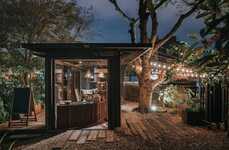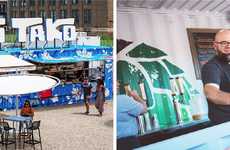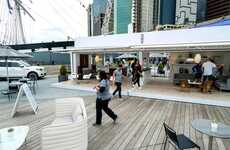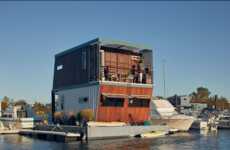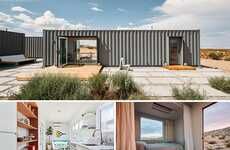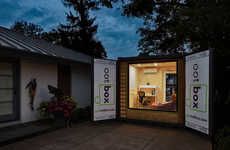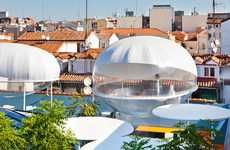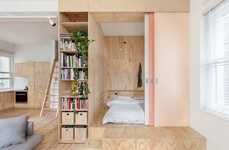
Village Underground Lisboa Includes Shipping Containers for Rent
Rahul Kalvapalle — August 26, 2014 — Art & Design
Village Underground Lisboa is a multi-use artistic space, put together from shipping containers and double-decker buses, located in the Portuguese capital Lisbon, or Lisboa.
The complex is currently installed at the Carris Museum, a public transport history museum. It comprises 14 shipping containers and a pair of double-decker buses arranged to form office spaces, a cafeteria and a central courtyard.
Each container in the development contains five tables aimed at start-ups, artists and other creative types, and costs patrons $197 per table per month, with electricity, WiFi and cleaning services included. Workspaces can also be rented by the hour or by the week. The development includes two double-decker buses containing cafeterias.
Eventually, the Village Underground Lisboa development will include a stage for concerts and a theater. The organizers are looking to collaborate with the London version of Village Underground, which opened in 2007 and features shipping containers as well as trains.
The complex is currently installed at the Carris Museum, a public transport history museum. It comprises 14 shipping containers and a pair of double-decker buses arranged to form office spaces, a cafeteria and a central courtyard.
Each container in the development contains five tables aimed at start-ups, artists and other creative types, and costs patrons $197 per table per month, with electricity, WiFi and cleaning services included. Workspaces can also be rented by the hour or by the week. The development includes two double-decker buses containing cafeterias.
Eventually, the Village Underground Lisboa development will include a stage for concerts and a theater. The organizers are looking to collaborate with the London version of Village Underground, which opened in 2007 and features shipping containers as well as trains.
Trend Themes
1. Shipping Container Workspaces - Creating unique workspaces using shipping containers presents an opportunity for innovative and flexible office solutions.
2. Multi-use Artistic Spaces - Transforming unconventional spaces into multi-use artistic venues provides a platform for unique and immersive experiences.
3. Collaborative Cultural Hubs - Establishing collaborative partnerships between artistic communities across different cities allows for the exchange of ideas and resources.
Industry Implications
1. Real Estate - The real estate industry can explore the concept of repurposing shipping containers to meet the growing demand for flexible and affordable office spaces.
2. Hospitality - The hospitality industry can incorporate the idea of multi-use artistic spaces to create memorable and engaging experiences for guests.
3. Entertainment - The entertainment industry can leverage collaborative cultural hubs to foster creativity, innovation, and the sharing of cultural experiences among different artistic communities.
3.3
Score
Popularity
Activity
Freshness


